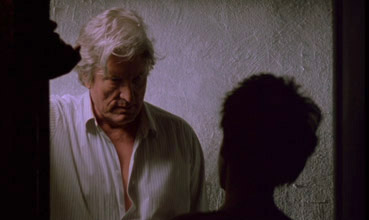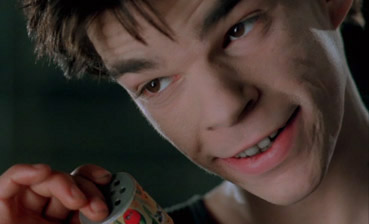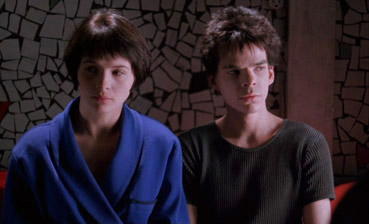|
As
many have noted, Leos Carax's second feature, Mauvais
sang (Bad Blood, but also known
by the rather limp title used here, The Night is Young), bears a great many
similarities to the director's debut, Boy
Meets Girl. Both feature Denis Lavant as a
young man named Alex who is at the end of a relationship
and becomes fixated on a woman just out of his reach; both
owe a stylistic debt to the films of the Nouvelle Vague
(Godard in particular); both take place in the heat of summer
and feature long conversations on love and relationships;
and both make exuberant use of a track by David Bowie. That
last one may seem like a tenuous connection, but the Bowie
track in both films is particularly memorable. I'll be coming
back to the one used in this film soon.
This
time around, Alex is the son of Jean, a key member of a small
and ageing criminal gang that owes money to a female crime
boss known only as The American Woman (Carroll Brooks, who
played the party host in Boy Meets Girl).
They have a job planned to pay off the debt that involves stealing a
culture of an AIDS-like virus from a drug company that is working
on a cure and selling it to the competition, a robbery for
which Jean's quick hands are essential. When Jean falls
under a subway train in what might just be murder, his two
colleagues approach his estranged son, whose lightning hands
are otherwise occupied pulling Three Card Monte grifts on
street corners. He's initially uninterested, but with his
father dead and the morgue chasing him to identify the body,
he could use the money to leave his 16-year-old girlfriend
Lise and start a new life elsewhere. On route to meet up
with surviving gang members Marc and Hans, he becomes entranced
by a beautiful young woman who boards his bus, later revealed
to be Anna (Juliette Binoche), the 29 year-old lover of
the considerably older Marc. The plan is outlined and the
following morning Alex is taken for his first parachute
jump, a practice run for his eventual departure to Switzerland.
Marc pressures Anna into making the jump with him, despite her
terror of heights. When she faints on the way down, it's
Alex who sees her safely to earth.

Up until this point, those similarities between this film
and its predecessor seem trivial at best. Mauvais
sang is livelier, faster paced, and boasts somewhat more adventurous
camerawork and editing, as well as being shot in colour instead of the earlier film's New Wave monochome. Like Boy Meets Girl,
its initially hooks you with its intrigue, but the hook here sinks deep and
doesn't let go, delivering a terrific first 30 minutes that
sets up the story and characters in stylish, compelling
and sometimes breathless fashion. But following a fight
between Alex and Marc (you can probably guess what sparks
it, but not why), the film shifts from fifth gear right
down to first and stays there for the next half-hour, as
Alex and Anna talk about love and relationships, and Alex declares
his feelings for a woman who is resolutely in love with someone
else. This is essentially a reworking of the kitchen scene
from Boy Meets Girl, and here the two films
are clearly the work of the same director, who was then
young enough to still be musing over these very issues in
regard to his own life. If you found the earlier version heavy going
then you're likely to groan most of the way through this,
and even if you didn't then you'll still probably find yourself
prickling with déjà-vu. As with its kitchen
scene predecessor, it's still well enough written
and performed to hold the interest – it's the gear change that
provides the initial jolt, the sudden slowing of pace bringing
the film momentarily close to a stall. A brief burst of
nitrous oxide is provided by the aforementioned Bowie track
– as Modern Love blast from the radio, Alex runs,
dances and cartwheels down the street in a skin-pricklingly
exuberant tracking shot, brought to a sudden halt when a
song that is now out of his earshot is unexpectedly switched
off.
The
pace picks up and the narrative complicates as the robbery
approaches, with the reappearance of old friends and new
enemies and an uncertainty just where Alex's loyalties ultimately
lie. From here on in, the story is developed in a most satisfying
manner and is laced with unexpected incident and inventive
and effective directorial flourishes. The real kicker is
the final scene, which delivers the sort of story round-off
and emotional punch that the more stylised conclusion of
Boy Meets Girl gives no indication Carax
was even interested in, let alone so ably capable of pulling off. And
the switch from monochrome to Fujicolor stock clearly presented no
problems for cinematographer Jean-Yves Escoffier, whose lighting, framing
and use of colour is little short of gorgeous.

The
performances are all nicely judged and effectively underplayed, but
once again it's Denis Lavant who shines the brightest. His
distinctive and expressive face at times has an almost
elven quality, like a creature who has wandered out of Legend's
fairyland onto the streets of Paris to become smitten with
a princess of human form, who is captivating played by the perfectly
cast Juliette Binoche. Completing the quartet are Hans Meyer (who makes a brief appearance
as an American astronaut in Boy Meets Girl) and veteran
actor Michel Piccoli,
who make Hans and Marc respectively, are both likeable and believable,
middle-aged criminals whose best years may be behind them
but whose past deeds are still all too visible in their
faces, words and body language.
It's
a risky move to follow a well-regarded debut film with
one that treads a similar path using many of the same actors,
but in Mauvais sang Carax develops and
expands on the themes of Boy Meets Girl
to such a degree that the earlier film looks in retrospect
almost like a trial run, a detailed sketch of ideas that
are more fully developed here. The small comic asides and
deviations from reality are still on board, not least in
Alex's attempts to cheer up Anna with increasingly impossible
conjuring tricks, and there are post-modernist references
to films of years past, from Max Sennett comedies and Chaplin's
The Kid to the high contrast expressionistic
lighting of 1940s American film noir. It's a rich and stimulating brew
that just about carries its mid-story slow-down, and points
the way to the film that has ended up, for better or worse,
as the one that ended up defining Carax's career to date
– Les Amants du Pont-Neuf.
1.66:1
and anamorphically enhanced, this is another lovely transfer
for the Leos Carax Collection. Colours are vibrant, detail
and contrast both very pleasing and the black levels solid.
The picture has a nicely film-like quality that splendidly
showcases Jean-Yves Escoffier's cinematography.

The
soundtrack is Dolby 2.0 mono, which is true to the original
film mix, and perfectly clear with a reasonable dynamic
range.
Outtakes
and Rushes (20:22)
An enjoyable blend of 8mm behind-the-scenes footage, unused
shots from the film, and outtakes, which are certainly funnier
than those on the Police Squad DVD. There's
some particularly revealing footage of the filming of the
parachute jump, an ingenious rig to grab a shot that would
now be done with CGI. I didn't mention above the pains Carax
goes to in order to show us that his actors really did the jump
themselves – the two near-misses for the stunt drivers here
illustrate how wrong that could have gone.
Trailer
(2:07)
Assembled with little regard for flow, but gives a taste
of the film.
Deleted
Scene (5:24)
A long exchange between Marc and Alex by quayside in its
edited form, in which Marc a reveals a little about his
world view and his advancing years, and looks back at times
past.
It's
been a while since I last saw Les Amants du Pont-Neuf,
so it's hard to say for certain if that remains my favourite
Carax film or whether Mauvais Sang has
stolen its crown. Either way, for my money it's the best
reason of all to own this set – the transfer is terrific
and it even has the most enjoyable special feature.
|